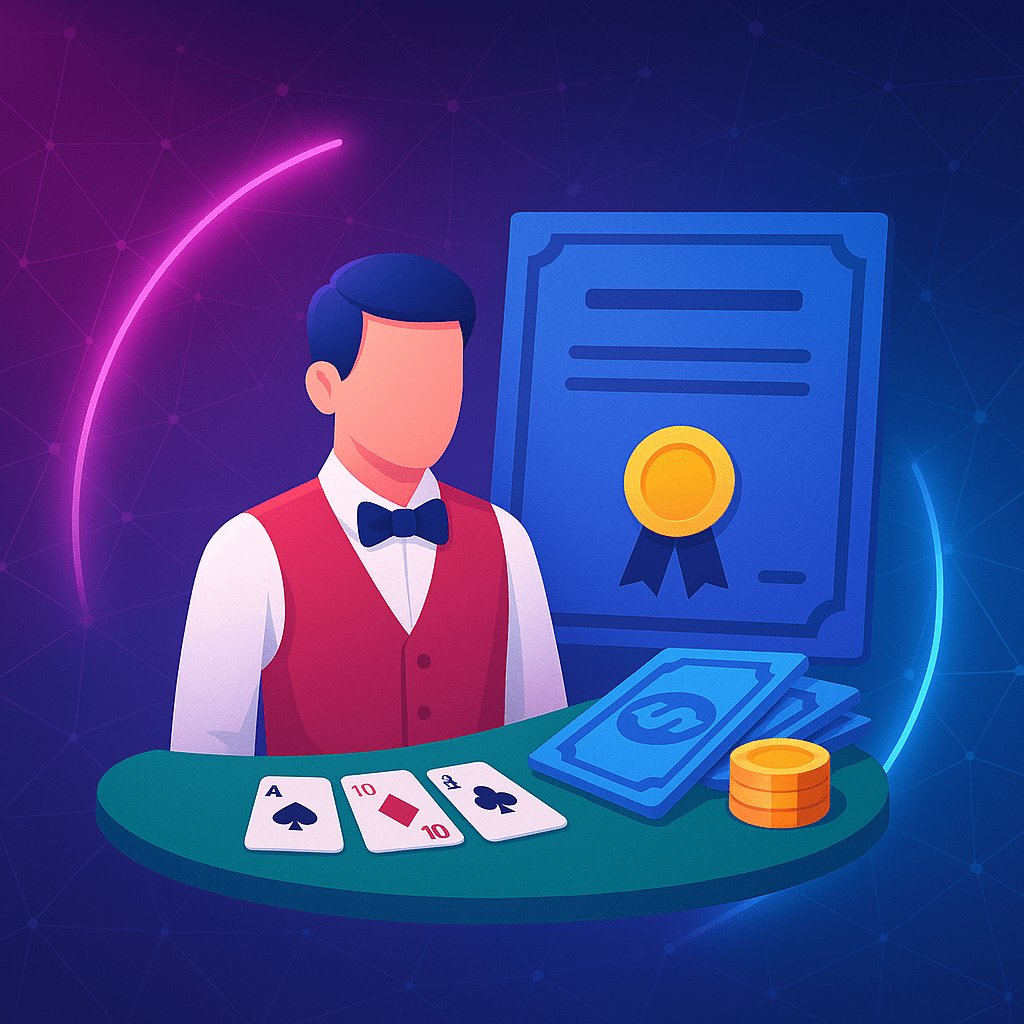Dealer training programs form the cornerstone of successful gaming operations, ensuring consistent service quality and regulatory compliance across all gaming venues. Modern training methodologies combine theoretical knowledge with practical skills development.
Core Training Components
Foundational Skills Development
Training programs typically encompass multiple skill categories:
Game-Specific Training:
- Blackjack: Card counting prevention, basic strategy knowledge
- Roulette: Wheel mechanics, betting pattern recognition
- Poker: Hand rankings, tournament procedures
- Baccarat: Drawing rules, commission calculations
Technical Competencies:
- Mathematical Accuracy – Rapid calculation skills
- Manual Dexterity – Card handling proficiency
- Surveillance Awareness – Security protocol understanding
- Customer Service – Professional communication standards
Certification Requirements
| Certification Level | Duration | Requirements | Renewal Period |
|---|---|---|---|
| Basic Dealer | 6-8 weeks | High school diploma | Annual |
| Advanced Dealer | 12-16 weeks | 1 year experience | Biennial |
| Floor Supervisor | 4-6 months | 3 years experience | Triennial |
| Pit Manager | 6-12 months | 5 years experience | Every 5 years |
Mandatory Certifications:
✓ Gaming Commission License
✓ Responsible Gaming Certificate
✓ Anti-Money Laundering Training
✓ Customer Service Excellence
✓ Emergency Response ProceduresProfessional Development Pathways
Career Advancement Structure:
graph TD
A[Entry-Level Dealer] --> B[Senior Dealer]
B --> C[Floor Supervisor]
C --> D[Pit Manager]
D --> E[Gaming Operations Manager]Specialized Training Tracks:
- Live Streaming Dealers: Camera presence, digital interaction
- VIP Table Specialists: High-stakes procedures, discretion protocols
- Tournament Directors: Event management, rule enforcement
- Training Instructors: Teaching methodology, assessment techniques
Training Methodologies
Simulation-Based Learning:
Modern training facilities utilize advanced simulators to replicate real gaming environments
- Virtual reality training modules
- Interactive gaming tables with digital feedback
- Recorded session analysis for improvement
- Peer evaluation systems
Mentorship Programs:
- Buddy System: New dealers paired with experienced professionals
- Shadowing Periods:
2-4 weeksof supervised gameplay - Progressive Responsibility: Gradual increase in table limits
Continuous Education:
- Monthly workshops on industry updates
- Quarterly assessments of performance metrics
- Annual recertification requirements
- Specialized seminars on emerging technologies
Quality Assurance Standards
Performance Metrics:
- Accuracy Rate: Minimum
99.5%for all transactions - Game Speed: Optimal hands per hour benchmarks
- Customer Satisfaction: Player feedback scores
- Compliance Adherence: Zero tolerance for violations
Assessment Methods:
- ✓ Written examinations on game rules
- ✓ Practical demonstrations under supervision
- ✓ Mystery shopper evaluations
- ✓ Peer review assessments
Industry Standard: Most gaming establishments require dealers to complete
200+ hoursof training before floor assignment.
Conclusion: Comprehensive dealer training programs ensure operational excellence while creating clear career advancement opportunities. Investment in professional development translates directly into enhanced player experiences and regulatory compliance across all gaming operations.
